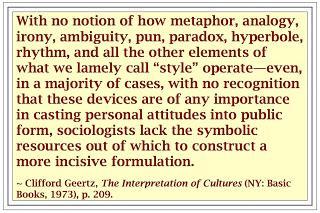
Sunnivie Brydum asks whether it's fair to put irony-signaling quotation marks around the terms "religious freedom" and "religious liberty," when we're talking about what the religious and political right wishes to make of those concepts today. After all, religious freedom has a venerable place in the American democratic experiment, and its central thrust has been, from the inception of the nation until fairly recently, to protect the rights of marginalized communities against the overweening dictates of the majority.
She writes:
Indeed, if we are discussing the abstract concept of religious liberty — the kind guaranteed by the First Amendment to the U.S. Constitution — it's hard to justify scare quotes. Even the federal Religious Freedom Restoration Act (RFRA) came into being through what appeared to be a sincere effort to protect the religious rituals and traditions of marginalized faith communities broadly speaking. In what is, by today's standards, an inconceivable display of bipartisanship, a nearly unanimous Congress approved the federal RFRA in 1993 as a response to a Supreme Court decision that upheld the firing of two Native Americans who lost their jobs as drug counselors after using peyote during a religious ceremony.
But now:
But modern iterations of this type of legislation (See: Indiana, Arkansas, Mississippi) have changed the RFRA game. This new framework shifts RFRA's intent from remedying an actual injury, to instead serve as an enforcement mechanism for the socially conservative understanding of law and, most crucially, sexual morality. (The question around what extent Congress should be legislating our bedroom behavior is another beast entirely.)
This new, mutant form of "religious liberty" does indeed deserve scare quotes. When Mississippi lawmakers overwhelmingly passed a law that determined what kind of intimate relationships are worthy of protection, they also lost the ability to claim that they were seeking to protect faith-based views broadly speaking. Laws like this have less to do with making sure people can freely practice their faith—they are written to privilege one ideological perspective over all others. And that, as it turns out, is a clear violation of the Equal Protection clause of the Constitution, as out attorney Roberta Kaplan successfully argued to block a pivotal portion of that Mississippi law, which allowed county clerks to refuse to sign marriage licenses for same-sex couples.
And so:
Religious freedom is indeed a central tenet of American democracy. The freedom to worship how, when, and whom you wish has long served as a cornerstone of our culture, and has helped to facilitate the ideological melting pot that is the United States.
But when freedom of religion is used as a weapon to infringe on civil liberties—especially in the public square—it deserves the scare quotes that the Chicago Manual of Style says are "used to alert readers that a term is used in a nonstandard (or slang), ironic, or other special use."
At the very least, the clearly coordinated and targeted effort to rebrand the freedom to discriminate as "religious freedom" meets the Oxford English Dictionary's criteria for the use of scare quotes (emphasis mine):
"Quotation marks used around a word or phrase when they are not required, thereby eliciting attention or doubts."
Increased attention and elevated skepticism are precisely what is required of claims that suggest "religious freedom" cannot exist in harmony with LGBT equality.
ATTN: Michael Sean Winters at National Catholic Reporter and Unites States Conference of Catholic Bishops.

